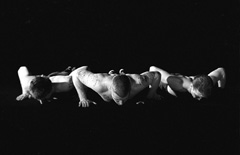Rehearsals
Repetitioner SWEDEN / 2004 / Swedish / Color / 35mm (1:1.85) / 101 min
SWEDEN / 2004 / Swedish / Color / 35mm (1:1.85) / 101 min
Director, Editing: Michal Leszczylowski
Photography: Gunnar Källström
Sound: Göran Edström, Patrik Strömdahl
Producer: Christer Nilsson
Production Company: Göta Film AB
Source: Swedish Film Institute
7:3 is a theatrical project in which three actual prisoners perform on public stage. Footage of the director conducting rehearsals at the prison, the testimony of prisoners some of whom are Neo-Nazis and the actual performance are weaved into one complex story. Reality and fact are blurred with fiction and script into a borderless world that will bewilder audiences. Having caused great controversy in the Swedish media, this project sets off into unexpected directions.
[Director’s Statement] My fellow countryman, Joseph Conrad, defined the purpose of art in following way: “The artist has to grasp a piece of time, to conserve it and show it to others.”
These words inspired me as a filmmaker, they describe what my work consists of and where the effort is to be put. It is simply to thoroughly capture the reality in its full complexity. I try not to interpret it in the film and I am aware that I only can understand a bit of it. The rest of the truth is there—hidden partly by the fog of our ignorance but mostly by our fear.
In the case of the play 7:3, the ignorance and the fear of so-called intellectual elite became very visible and loud. The angry discussions about letting neo-Nazi ideas be expressed on a theater stage were endless and unsophisticated. There were people who wanted to stop the play and the film about it.
When two policemen were killed and a neo-Nazi network was discovered I started to doubt whether I had the strength to finish the project. But I believe that only an open society can be vital and strong, and as an artist I felt obliged to “grasp that little piece of our time and give it to the audience.”
 Michal Leszczylowski
Michal Leszczylowski
Born 1950 in Lodz, Poland (accounting for the complicated but pleasant sounding name), Michal Leszczylowski was educated at Dramatiska institutet—University College of Film, Radio, Television and Theatre, 1976–78, and after graduation worked there as a film editor and principal teacher in film editing. The majority of his time there was spent editing or supervising the editing process of documentaries. During this time he began collaborating with producer Lisbet Gabrielsson. In 1985 he worked with Andrey Tarkovsky on his last film The Sacrifice (1986), and three years later made his directorial debut with Directed by Andrey Tarkovsky (1988) which was produced by Gabrielsson. Michal began the first of many successful collaborations with famed director Liv Ullmann in 1994 making Kristin Lavransdatter (1995). He has worked as an editor on over thirty award-winning films including The Guardian Angel (dir. Susanne Ostens, 1990), Fire-Eater (dir. Pirjo Honkasalo, 1998), Show Me Love (dir. Lukas Moodysson, 1998), Together (dir. Lukas Moodysson, 2000) and the highly acclaimed A Summer Tale (dir. Ulf Malmros, 2000). Dramatiska institutet granted him the title of professor in 1997. |
